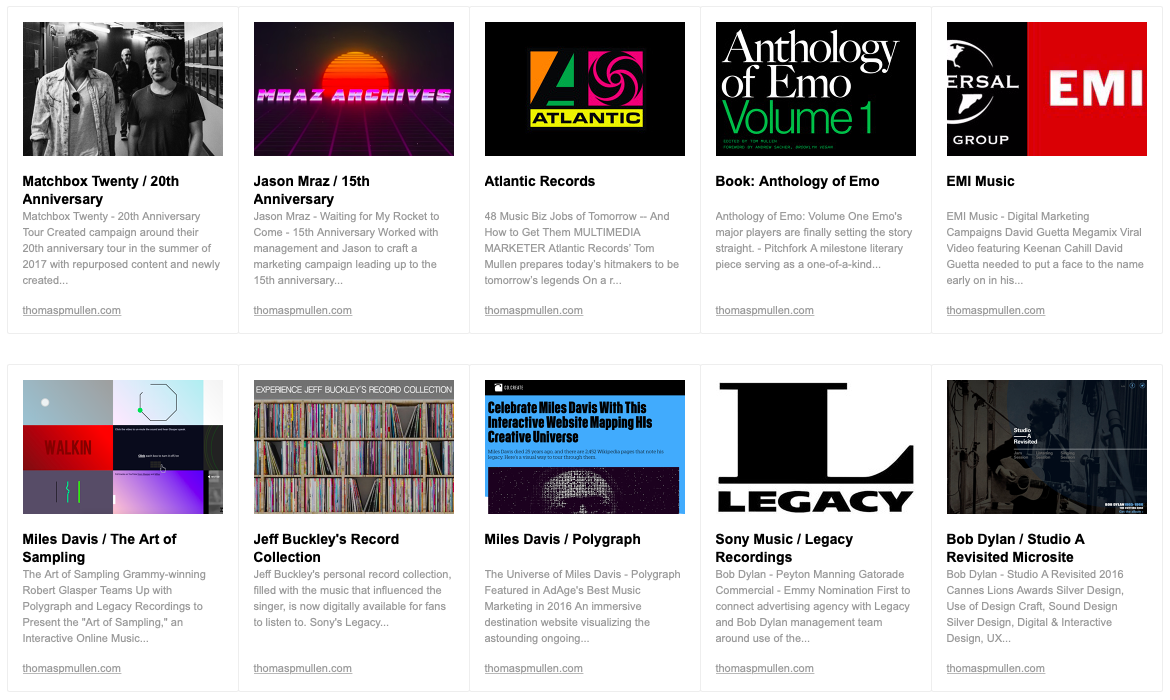In his role as VP, Marketing Catalog and Podcasting at Atlantic Records (one of Billboard’s Music Biz Jobs of Tomorrow), Tom Mullen helps artists to archive the present for the future. We recently spoke to him about trailblazing new catalog marketing methods, the secrets to a great campaign, recent projects and more…
Can you explain your role as VP, Marketing Catalog and Podcasting at Atlantic Records?
My role is primarily marketing catalog. I am responsible for the on-roster catalog of Atlantic and Elektra Records. That means that if the artist is currently signed and active, I am the caretaker/curator of those assets (audio, photos, video, etc.) from those releases and work to market them across all departments within the label around things like anniversaries and milestones. Off-roster is the older material like Led Zeppelin or Aretha Franklin, which is what Rhino, the catalog label that WMG handles. I’m essentially artist developing the artists today to be legends tomorrow.
“I’m essentially artist developing the artists today to be legends tomorrow.”
As for podcasting, I took over the role a few months into my job after some colleagues found out I’ve been podcasting myself for many years and asked if I’d help. That led to me creating a podcast network and best practices for the label. In addition, it leads back to catalog as I’m recording and archiving the artist’s voices and stories in the moment. I’m a genuinely curious person about anything so with music I’m able to be creative while helping the artists tell their story for generations to come.
In this interview with Music Ally you talk about encouraging artists to be proactive in archiving content for the future. How you help artists put that into practice?
An artist today thinks that everything is on their phone and it’ll be there forever. When in reality, it’s highly likely that we’ll lose those photos, accidentally drop the hard drive or delete a file from our computer. It’s paramount that an artist realizes this and documents their life because no one else will take the care that they will for their legacy. How I get it done is one by one with each artist and their management. Explaining the benefits, showing examples, going on a tour of our facilities in Los Angeles and show the care and dedication we have to making sure that generations after you are able to hear, see and connect with your art.
Can you talk us through some of your recent projects with Atlantic artists?
I’ve worked across all genres at the label so far. We’ve had simple digital campaigns to add subscribers to an artist’s YouTube channel, we’ve spent hours going through a storage unit to catalog and use for future projects, and helped the label see how the artists as a brand is key and involving the catalog (songs that are already hits) into the day-to-day of the marketing has been some of the most rewarding projects so far. Artists we’ve done stuff with include Jason Mraz, Matchbox 20, Cardi B and Ed Sheeran.
There’s so much choice now when it comes to releasing content, from digital experiences and streaming platforms to traditional physical release formats. How do you determine what’s right for each artist/campaign?
We look at the data. It’s that simple. We know how someone sells on each platform, vinyl, etc. It’s all there for us to see what makes sense with streaming and also react to when something is happening to be nimble and learn from that moment. You also listen to the artist, management, and the team to really get into the head of the artist to realize what make them tick, what they’re comfortable with. Little bit of data, heart from the artist, and experience.
“You listen to the artist, management, and the team to really get into the head of the artist to realize what make them tick, what they’re comfortable with. Little bit of data, heart from the artist, and experience.”
How do you judge the success of a campaign?
Did we learn anything from this campaign and what can we do different next time and streaming numbers/data? We are tracking everything so we look to see what everything did from the ads, the content, and sentiment. Another factor is the artist’s involvement. Did we see organic posts? Did we get management on board with an idea that could lead to something bigger later? What did we see happen from the campaign big or small and how can we replicate or adjust for the next time? It’s always going to be little wins with everyone as we blaze new trails in this category of marketing.
In your previous role at Legacy Recordings your focus was promoting heritage catalog. What are the main considerations involved in marketing those artists?
The heritage artists are mostly not up for anything or they’ve passed away. You have to understand the backstory to make decisions that are right for the artist in that point of their career or explain to the estate. The root of the idea always has to tell the story about that particular song, album or time period. If it’s not doing that and it’s just some “cool digital idea,” it’s not going to work.
“The root of the idea always has to tell the story about that particular song, album or time period. If it’s not doing that and it’s just some “cool digital idea,” it’s not going to work.”
I also consider the album and how impactful it was, what was possibly missed in the album that wasn’t talked about then or maybe it’s relevant now because of a situation happening today. It could be partners, the bigger the artist/album could bring in a larger company or agency that wants to be a part of that artist and if it fits with the story and the goal, then you pursue that heavily.
What about older catalog that has had little or no previous success but still has potential? What would your advice be to labels and publishers with that type of music?
Yes. I spent a lot of time with this type of catalog in my spare time around my own website/podcast. So many albums were overlooked or panned back in the day that in turn, 10 or 20 years later, are revered. My advice would be to find people knowledgeable about that type of music/era and ask their guidance on what stories still haven’t been told, what other things could be mentioned and how to re-start a great song that has been left on the shelf. One sync, one Tweet or a meme using the song by someone could lead to a renaissance for that song.
In a recent article we looked at where streaming playlists are going and how they can become more innovative/immersive experiences. What are your thoughts on this?
I believe that a person that you trust telling you about a song is more impactful than a computer telling you. Regardless of how playlists will become more dynamic, you still need that personal touch to get the nuances and differences in things. I made some playlists for Beats Music before Apple bought them and for years, my playlists went unchanged. Not that I’m a genius, but because I knew the correlations between the music, the flow, and what made sense to the listener. As things get more nuanced, playlists will change and artists, labels and the streaming companies will need that human help to keep them real. Not as a gatekeeper but to keep the experience authentic.
As someone heavily involved in podcasts, what role do you think they can play in reinvigorating catalog?
Podcasting is all about storytelling. I am very altruistic in my approach to this. I want to hear from them, hear their story, and not just what everyone else asks. I want someone to learn something new about that artist and the best way is to have a conversation with them and feel you’re sitting there and you are asking the questions those that are listening want to have asked. After 150+ interviews, I have a good idea on how to get that story and more often than not, that story connects a fan to the music more. In turn, they’re going to listen to the catalog. There is no better way to tell your story, have an attentive audience in this capacity aside from a live show, than a podcast. We haven’t even scratched the surface of what we can do.
“There is no better way to tell your story, have an attentive audience in this capacity aside from a live show, than a podcast. We haven’t even scratched the surface of what we can do.”
What projects are you most proud of and why?
I am proud with things both personally and professionally with music and how they intersect. I started a podcast myself for fun because the stories of my favorite artists weren’t anywhere online. That led to me meeting my heroes and making a book of those stories. At work, my love of history and storytelling led me to this current role at Atlantic and because I was versed in podcasting, I took that on as well. Something out of love led to something in a real-life work setting. Can’t beat that.
Artist/project wise, I’m most proud to have worked with Bob Dylan for a few projects, with one of those being a Cannes, Clio and One Show winner. Also, Jeff Buckley, which was started as an idea that I had to convince the entire company to do and had quite a lot of resistance early on. Ended up being a big success and something I’m most known for. I also had a blast working on projects with The Clash, Miles Davis and Johnny Cash’s estate. Here at Atlantic, I’m most proud of projects around Jason Mraz, Cardi B, and getting the idea of marketing catalog deeper within the culture of the label. It’s a challenging endeavour but one that’s rewarding to see that you continued that artist’s story for the next generation.


1 comment
[…] https://www.synchtank.com/blog/preparing-todays-hitmakers-to-be-tomorrows-legends-a-qa-with-atlantic… […]